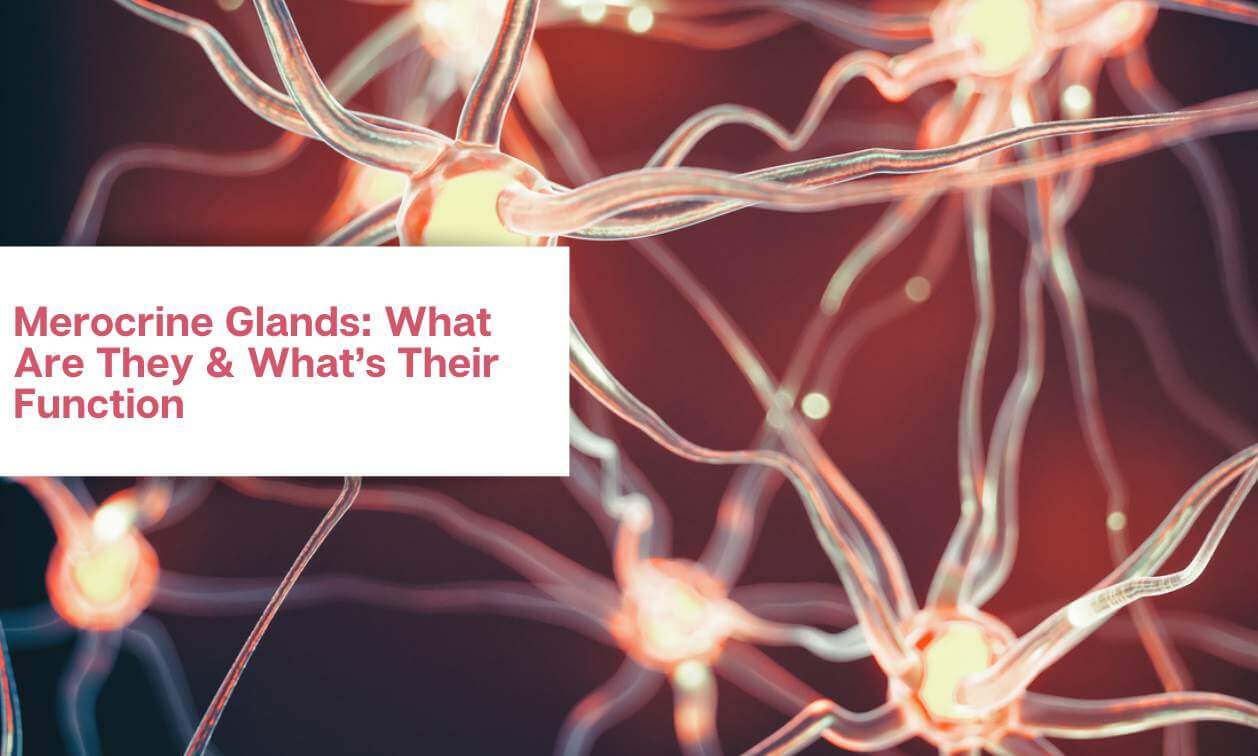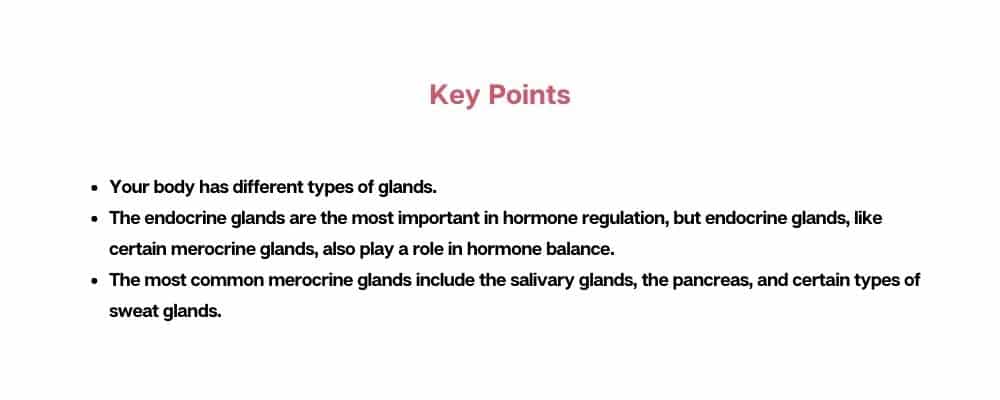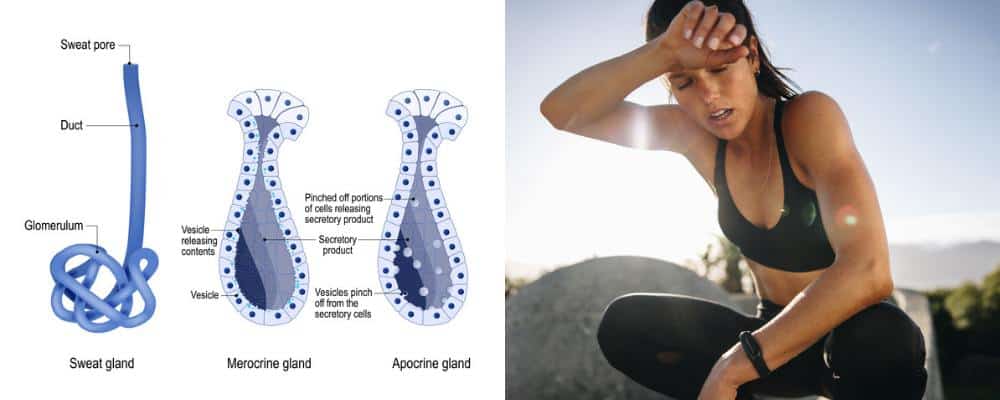
Merocrine Glands: What Are They & What’s Their Function
Table of Contents
Your body has different types of glands. There are endocrine glands and exocrine glands. The merocrine glands fall into the category of “exocrine” glands, so named because they excrete biological compounds through ducts to the “external” parts of the body, such as sweat from your sweat glands and saliva from your salivary glands. There are other merocrine glands as well. Apocrine glands are another type of endocrine gland that secrete their products differently than merocrine glands.
Merocrine glands contain specialized secretory cells that excrete products through the ducts, usually directly onto bodily surfaces or externally, such as in the case of certain sweat glands, tear ducts, and salivary glands. This is as opposed to the action of endocrine glands which secrete their products internally or directly into the bloodstream.
There are several different merocrine glands, and they have varied functions depending on the organ in your body they’re associated with. Overall, the purpose of all merocrine glands is to make and release chemicals to assist in bodily functions in some way. Since some of those processes include things like digestion and temperature regulation, the merocrine glands can be very important to your health and wellbeing.
What Glands Are Considered Merocrine Glands?
The most well-known example of a merocrine gland is the salivary glands; one type of sweat gland is also a merocrine gland.
The glands that are most associated with hormones and hormone imbalances are the glands of the endocrine system. These are the glands that secrete critical hormones such as testosterone, human growth hormone, and estrogen directly into the bloodstream.
However, the glands of the exocrine system and the merocrine glands also have a role to play in many bodily functions as well as in maintaining proper hormone balance. Exocrine glands interact with the external systems of the body. That is easy to see with sweat glands and salivary glands. But your digestive system is also considered an “external” part of the body. It may be hard to think of the digestive system as “external,” but, it is exposed to the outside world on both ends of your will via the mouth and anus, and there are merocrine glands, such as the pancreas, that play a critical role in digestion.
What Is the Difference Between Merocrine and Apocrine Glands?
The sweat glands are one of your main exocrine glands. There are two types of sweat glands, only one of which is considered a “merocrine” gland. Merocrine sweat glands secrete sweat directly onto the surface of the skin. Therefore they met the definition of a merocrine gland. Apocrine sweat glands secrete sweat into a bulb at the end of hair follicles rather than directly onto the skin’s surface and into the open air.
Also, the types of sweat produced by the two different glands are not the same. The sweat secreted by the merocrine sweat glands is the clear, thin watery sweat you are most familiar with, seen seeping from your skin on a hot day or when you are exerting yourself. The apocrine sweat glands produce a thicker kind of fluid that is less involved in temperature regulation as it is designed to provide nutrients to the bacteria on the skin. And finally, merocrine sweat glands are all over your body throughout the skin, while apocrine sweat glands are only found in a few specific places, such as the base of the hair follicle.
What Is the Function of the Merocrine Glands?
As you have probably figured out by now, your merocrine glands have many different functions. Depending on the gland and bodily system involved, the merocrine glands help your body do the following:
- Digest your food, absorb nutrients and turn calories into energy.
- Protect and lubricate the inner lining of your organs.
- Regulate your body temperature.
- Lubricate your hair and skin.
What Are the Most Important Merocrine Glands, and What Do They Do?
The merocrine glands are a specific type of exocrine glands that release their substances through a process called exocytosis. Exocytosis is a complex process that ensures that the substances secreted by the glands do not damage the cell or the cell membrane at all when they are released. The most important merocrine glands are the salivary glands, the pancreatic glands, and one of the two types of sweat glands.
Salivary glands – You may think that saliva or spit is annoying and serves no useful purpose, but indeed saliva and the salivary glands play an important role in your health. First of all, saliva begins the process of digestion. Saliva contains enzymes that start breaking down your food as you chew. Saliva also helps you swallow, and it lubricates and protects the inner linings of the esophagus and other tissues.
Pancreatic glands – The pancreas is one of the most critical endocrine glands of the digestive system. The pancreatic glands release enzymes that help break down food. They also help your body absorb important nutrients. It does this by secreting a fluid that contains digestive enzymes into the duodenum, which is the first part of the small intestine, receiving food straight from your stomach. These enzymes help to break down carbohydrates, proteins, and fats in the foods you eat into the energy your need for your cells.
Certain sweat glands – The more prominent type of sweat glands, the ones that allow you to “sweat” through the surface of your skin and regulate your body temperature, are merocrine sweat glands. The merocrine sweat glands respond to signals from the brain to begin the excretion of sweat when the body needs cooling down in response to heart, fever, or extreme physical exertion.
Conclusion
In conclusion, the merocrine glands are a specific type of gland of the exocrine system distinguished by the way they secrete their products into the external environment.
The salivary glands, the pancreatic glands, and most of your sweat glands are the major merocrine glands. The merocrine glands, along with the rest of the glands of the exocrine and endocrine systems, play a critical role in regulating most, if not all, of your bodily functions. All these glands need to function well and in harmony in order for you to maintain optimal health and enjoy peak physical and mental performance at any age.
Understanding all your glands, including your merocrine glands, and the purposes they serve can help you recognize when something may be “off” and when you may need to have your hormone levels checked by doctors like those at our clinics that specialize in treating hormone balances and age-related hormone decline.


